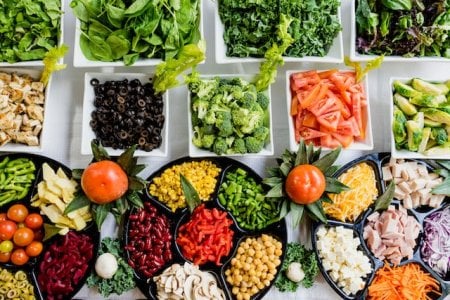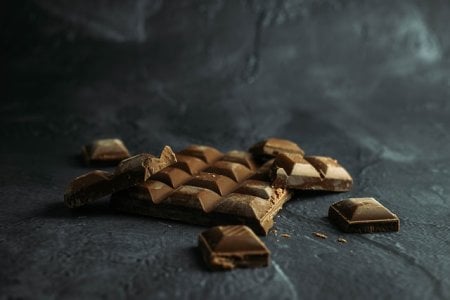Eating these foods could give you a younger-looking skin!
By
Seia Ibanez
- Replies 1
Did you know that the path to an ageless, radiant complexion could be found in your kitchen pantry?
A beauty-friendly diet doesn't have to consist only of green teas and kale smoothies. Recently, nutritionists and dermatologists shared about the building blocks of a complexion-enhancing diet.
According to Jamie Nadeau, a registered dietician, 'The best foods to prioritise for healthy, hydrated skin are foods that are rich in vitamins and minerals and healthy fats.’
Jamie said that tomatoes and citrus fruits are high in Vitamin C and can ‘support’ collagen in your body.
She also recommended eating salmon—an ‘excellent choice’—nuts and blueberries because they improve overall skin health.
‘Not only is it rich in protein, but it's also rich in anti-inflammatory omega-3 fatty acids,' Jamie explained.
'It's also a source of vitamin E, which is an important antioxidant for skin health.'
Include vitamins A, C, and E in your diet
Registered dietician Steph Graso said to check foods containing vitamins A, C, and E.
Steph said that vitamin E foods, such as fish and avocado, ‘aid in moisture retention’ while vitamin A foods like eggs, sweet potatoes, and mangoes are ‘important for skin cell production and repair’.
She also recommended looking for foods with zinc as they help heal wounds and inflammation. Some include oysters, quinoa, legumes, and oats.
But according to dermatologist Dr Leah Ansell, vitamins A, C, and E are quite helpful for skin health but don’t answer for everything.
‘There is no one food or drink that will miraculously lead to clear, healthy skin,' she said.
'But there is data to support certain behaviours and choices that can set one's skin to be in its optimised state.’
'While there's not a lot of hard data, general principles to help combat free radical damage and build collagen help guide good food choices for those looking to optimise healthy skin,’ she explained.
'Bone broth, fruits and veggies rich in vitamins A, C, E and folate (berries, sweet potatoes, leafy greens, broccoli) are some great options.'
Eat foods with Omega-3 fatty acids
To make your skin hydrated, Steph recommended food that contains omega-3 fatty acids—walnuts and sardines.
Omega-3 ‘helps strengthen the skin's natural barrier.'
'This acts as a protective shield against environmental stressors and prevents water loss from the skin, resulting in better moisture retention and hydrated, plump skin,' Steph explained.
'Foods rich in omega-3 fatty acids include fatty fish (salmon, sardines, albacore tuna, anchovies), flaxseeds, chia seeds, walnuts, hemp seeds, and edamame.'
Nutritionist Jenna Werner, the owner of the nutrition service Happy Strong Healthy, said that eating avocado and olive oils will get you those omega-3s and other healthy fats into your diet.
Stay Hydrated
Staying hydrated and eating foods with high water content are essential for having young-looking skin.
‘THE KEY is hydration,' Jenna said.
'So drinking water and making sure you are properly hydrated is first and foremost the most important thing for hydrated and glowy skin!'
'Water, electrolytes, and hydration-rich foods like fruits and veggies are key!' she added.
‘Things like cucumbers and watermelon are almost all full of water, but also oranges, strawberries and peppers are a few others to add in.'
Sam Garcia, a holistic health coach, added that there can be other ways to add extra hydration to your meals—adding a few sprinkles of chia seeds to a smoothie or salad!
‘Chia, flax, pumpkin seeds, sunflower seeds, almonds, walnuts, avocados, eggs, and beans are all easy ingredients to add to your daily salads or smoothies and are great options for upping skin hydration,’ she said.
Chocolates are allies
You might be surprised that even chocolate could be a skin ally. However, the chocolate referred to is not your standard supermarket variety. When it comes to skin health, the cocoa content is key.
‘Surprisingly, my favourite indulgence, CHOCOLATE, supports skin health,' Steph said.
'However, I'm not referring to a Hershey's milk chocolate bar.’
‘When considering chocolate and skin health, the quality and content of cocoa matter.’
'Cocoa contains flavonoids, antioxidants that may offer potential skin benefit,’ Steph explained.
‘The higher the cocoa content, the more flavonoids the chocolate is likely to contain. Look for dark chocolate with at least 70 per cent cocoa content or higher to gain potential skin-related benefits,' Steph said.
According to Jamie, dark chocolate is high in antioxidants, which may improve skin hydration and help reduce inflammation.
‘Dark chocolate is high in antioxidants, and some research shows that it can help your skin to withstand more UV radiation,' she said.
'Be sure to choose dark chocolate that is at least 70 per cent cocoa.'
However, it's not all sunshine and rainbows in the food world.
Some certain foods and drinks can compromise the health and appearance of our skin. DrLeah suggested that those suffering from acne might want to reconsider consuming low-fat dairy and processed carbohydrates.
‘For acne, studies have shown low-fat dairy and eating processed carbohydrates (white bread, pasta, desserts, for example) can worsen acne,' Dr Leah said.
'Despite what you may have been told—eating greasy foods like pizza or fatty foods like chocolate doesn't necessarily worsen acne.’
'I always recommend sticking to unprocessed carbs, full-fat dairy products, avoiding whey protein powder and eating lean proteins to optimise skin for those more acne-prone patients.'
Jamie also recommended that if you suspect your acne is caused by dairy, it might be worth removing it from your diet for a few months and observing if there's any improvement.
‘Research shows that removing dairy from your diet can be helpful for some people who are experiencing acne, but not everyone,' Jamie said.
'You can experiment by removing dairy for a few months to see if you notice any improvement. If not, it's unlikely to be the culprit of your acne.'
Don’t count tomatoes out
Tomatoes contain anti-ageing properties because of their bioactive components.
‘Tomatoes-carotenoids are the classes of bioactive compounds found in tomatoes. Lycopene is one of the major carotenoids which make up the antioxidant properties of a tomato,' Sam explained.
'Lycopene defends cells from oxidative damage and is commonly used in dermatological products for its protection against aging and UV rays.'
But you can also get bioactive components into our bodies in different ways.
‘Lycopene is fat-soluble and is best absorbed in the body when combined with additional fat. Try heating tomatoes with some olive oil to increase absorption,’ she suggested.
Other anti-ageing foods include fermented foods, like miso soup, cultured milk, yoghurt, kimchi, sauerkraut, and kombucha.
Kombucha contains AHA, which includes amino acids that keep the skin hydrated. Additionally, its vitamins B, C, and D enhance skin firmness, and its probiotics restore skin elasticity.
Alcohol and processed foods
While drinking alcoholic beverages can make you dehydrated or have a flushed face, you don’t have to stop consuming them completely.
Sam said that alcohol, sugar, and processed foods may not be the best, but some don’t want to remove them from their diets.
‘It's not realistic to suggest we eliminate these foods entirely from our diet, but it is imperative that we lower the intake,’ she said.
‘Eating consciously and intentionally will help you make the best decisions for your body, so you can eat foods you love but also minimise foods that don't make you feel good or support your health goals,’ she added.
'If you want to look glowy and youthful and reduce wrinkles, then you have to cut the crap out of your diet.'
Dr Leah said that working on your diet is only one of the elements in maintaining great skin.
‘I think a healthy diet may augment acne treatment, but often on its own is not enough,' she said.
'For anti-ageing purposes, I think the effect is subtle and not a silver bullet.
'But, in combination with great skincare and sun protection can be an important element.'
 Members, do not take this article as medical advice. Be sure to consult with your GP before making any changes to your diet.
Members, do not take this article as medical advice. Be sure to consult with your GP before making any changes to your diet.
Are you including these foods in your diet? What do you think are other ways to keep your skin young and healthy? Share them with us in the comments below!
A beauty-friendly diet doesn't have to consist only of green teas and kale smoothies. Recently, nutritionists and dermatologists shared about the building blocks of a complexion-enhancing diet.
According to Jamie Nadeau, a registered dietician, 'The best foods to prioritise for healthy, hydrated skin are foods that are rich in vitamins and minerals and healthy fats.’
Jamie said that tomatoes and citrus fruits are high in Vitamin C and can ‘support’ collagen in your body.
She also recommended eating salmon—an ‘excellent choice’—nuts and blueberries because they improve overall skin health.
‘Not only is it rich in protein, but it's also rich in anti-inflammatory omega-3 fatty acids,' Jamie explained.
'It's also a source of vitamin E, which is an important antioxidant for skin health.'
Include vitamins A, C, and E in your diet
Registered dietician Steph Graso said to check foods containing vitamins A, C, and E.
Steph said that vitamin E foods, such as fish and avocado, ‘aid in moisture retention’ while vitamin A foods like eggs, sweet potatoes, and mangoes are ‘important for skin cell production and repair’.
She also recommended looking for foods with zinc as they help heal wounds and inflammation. Some include oysters, quinoa, legumes, and oats.
But according to dermatologist Dr Leah Ansell, vitamins A, C, and E are quite helpful for skin health but don’t answer for everything.
‘There is no one food or drink that will miraculously lead to clear, healthy skin,' she said.
'But there is data to support certain behaviours and choices that can set one's skin to be in its optimised state.’
'While there's not a lot of hard data, general principles to help combat free radical damage and build collagen help guide good food choices for those looking to optimise healthy skin,’ she explained.
'Bone broth, fruits and veggies rich in vitamins A, C, E and folate (berries, sweet potatoes, leafy greens, broccoli) are some great options.'
Eat foods with Omega-3 fatty acids
To make your skin hydrated, Steph recommended food that contains omega-3 fatty acids—walnuts and sardines.
Omega-3 ‘helps strengthen the skin's natural barrier.'
'This acts as a protective shield against environmental stressors and prevents water loss from the skin, resulting in better moisture retention and hydrated, plump skin,' Steph explained.
'Foods rich in omega-3 fatty acids include fatty fish (salmon, sardines, albacore tuna, anchovies), flaxseeds, chia seeds, walnuts, hemp seeds, and edamame.'
Nutritionist Jenna Werner, the owner of the nutrition service Happy Strong Healthy, said that eating avocado and olive oils will get you those omega-3s and other healthy fats into your diet.
Stay Hydrated
Staying hydrated and eating foods with high water content are essential for having young-looking skin.
‘THE KEY is hydration,' Jenna said.
'So drinking water and making sure you are properly hydrated is first and foremost the most important thing for hydrated and glowy skin!'
'Water, electrolytes, and hydration-rich foods like fruits and veggies are key!' she added.
‘Things like cucumbers and watermelon are almost all full of water, but also oranges, strawberries and peppers are a few others to add in.'
Sam Garcia, a holistic health coach, added that there can be other ways to add extra hydration to your meals—adding a few sprinkles of chia seeds to a smoothie or salad!
‘Chia, flax, pumpkin seeds, sunflower seeds, almonds, walnuts, avocados, eggs, and beans are all easy ingredients to add to your daily salads or smoothies and are great options for upping skin hydration,’ she said.
Chocolates are allies
You might be surprised that even chocolate could be a skin ally. However, the chocolate referred to is not your standard supermarket variety. When it comes to skin health, the cocoa content is key.
‘Surprisingly, my favourite indulgence, CHOCOLATE, supports skin health,' Steph said.
'However, I'm not referring to a Hershey's milk chocolate bar.’
‘When considering chocolate and skin health, the quality and content of cocoa matter.’
'Cocoa contains flavonoids, antioxidants that may offer potential skin benefit,’ Steph explained.
‘The higher the cocoa content, the more flavonoids the chocolate is likely to contain. Look for dark chocolate with at least 70 per cent cocoa content or higher to gain potential skin-related benefits,' Steph said.
According to Jamie, dark chocolate is high in antioxidants, which may improve skin hydration and help reduce inflammation.
‘Dark chocolate is high in antioxidants, and some research shows that it can help your skin to withstand more UV radiation,' she said.
'Be sure to choose dark chocolate that is at least 70 per cent cocoa.'
However, it's not all sunshine and rainbows in the food world.
Some certain foods and drinks can compromise the health and appearance of our skin. DrLeah suggested that those suffering from acne might want to reconsider consuming low-fat dairy and processed carbohydrates.
‘For acne, studies have shown low-fat dairy and eating processed carbohydrates (white bread, pasta, desserts, for example) can worsen acne,' Dr Leah said.
'Despite what you may have been told—eating greasy foods like pizza or fatty foods like chocolate doesn't necessarily worsen acne.’
'I always recommend sticking to unprocessed carbs, full-fat dairy products, avoiding whey protein powder and eating lean proteins to optimise skin for those more acne-prone patients.'
Jamie also recommended that if you suspect your acne is caused by dairy, it might be worth removing it from your diet for a few months and observing if there's any improvement.
‘Research shows that removing dairy from your diet can be helpful for some people who are experiencing acne, but not everyone,' Jamie said.
'You can experiment by removing dairy for a few months to see if you notice any improvement. If not, it's unlikely to be the culprit of your acne.'
Don’t count tomatoes out
Tomatoes contain anti-ageing properties because of their bioactive components.
‘Tomatoes-carotenoids are the classes of bioactive compounds found in tomatoes. Lycopene is one of the major carotenoids which make up the antioxidant properties of a tomato,' Sam explained.
'Lycopene defends cells from oxidative damage and is commonly used in dermatological products for its protection against aging and UV rays.'
But you can also get bioactive components into our bodies in different ways.
‘Lycopene is fat-soluble and is best absorbed in the body when combined with additional fat. Try heating tomatoes with some olive oil to increase absorption,’ she suggested.
Other anti-ageing foods include fermented foods, like miso soup, cultured milk, yoghurt, kimchi, sauerkraut, and kombucha.
Kombucha contains AHA, which includes amino acids that keep the skin hydrated. Additionally, its vitamins B, C, and D enhance skin firmness, and its probiotics restore skin elasticity.
Alcohol and processed foods
While drinking alcoholic beverages can make you dehydrated or have a flushed face, you don’t have to stop consuming them completely.
Sam said that alcohol, sugar, and processed foods may not be the best, but some don’t want to remove them from their diets.
‘It's not realistic to suggest we eliminate these foods entirely from our diet, but it is imperative that we lower the intake,’ she said.
‘Eating consciously and intentionally will help you make the best decisions for your body, so you can eat foods you love but also minimise foods that don't make you feel good or support your health goals,’ she added.
'If you want to look glowy and youthful and reduce wrinkles, then you have to cut the crap out of your diet.'
Dr Leah said that working on your diet is only one of the elements in maintaining great skin.
‘I think a healthy diet may augment acne treatment, but often on its own is not enough,' she said.
'For anti-ageing purposes, I think the effect is subtle and not a silver bullet.
'But, in combination with great skincare and sun protection can be an important element.'
Key Takeaways
- Expert nutritionists, dieticians, and a dermatologist revealed what foods can transform your skin for an ageless complexion.
- The experts advised prioritising foods rich in vitamins, minerals, and healthy fats, such as oysters, colourful fruits and vegetables, nuts, seeds, fatty fish, and even chocolate.
- Hydration is also essential for achieving glowy skin, with recommendations for consuming water, electrolytes, and water-rich foods like fruits and vegetables.
- While alcohol, sugar, and processed foods are not great for the skin, they do not need to be wholly cut out, but their intake should be lowered.
Are you including these foods in your diet? What do you think are other ways to keep your skin young and healthy? Share them with us in the comments below!









